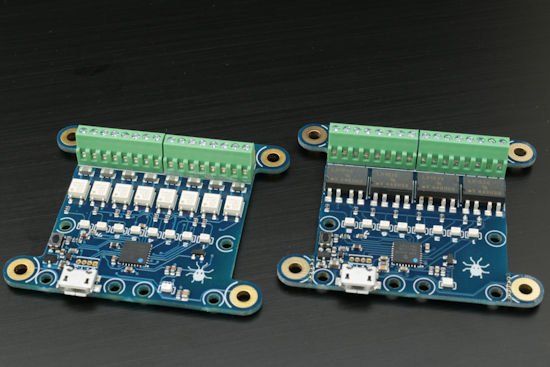![]() Relays are one of the most fundamental components used in automation: opening and closing a circuit is the most intuitive way to remotely control a machine. We offer several kinds of USB driven relays, depending on the type of circuit to be switched. But we also have an alternate choice: solid-state relays, solely based on semiconductors. And on this topic, we have fresh news...
Relays are one of the most fundamental components used in automation: opening and closing a circuit is the most intuitive way to remotely control a machine. We offer several kinds of USB driven relays, depending on the type of circuit to be switched. But we also have an alternate choice: solid-state relays, solely based on semiconductors. And on this topic, we have fresh news...
A solid state relay is an electronic component that behaves almost like a relay, but that does not include any moving part: the electromagnet used to switch the relay is replaced by an optocoupler, and the contacts that close when the relay is active are replaced by FET transistors or similar components.
Solid-state relays have several advantages over mechanical relays:
- they consume less energy to maintain an active state
- the switch faster (typically less than a millisecond), without bounce
- they experience almost no aging, contrarily to mechanical relays
- they are significantly smaller than mechanical relays
However they often exhibit two significant problems: when they are open, they might not be really as open as a mechanical relay. And when they are closed, they might not be completely equivalent to a closed circuit. These drawbacks used to prevent their use for several applications.
Luckily, these technology make progress, and today we announce an evolution of our Yocto-MaxiCoupler: six years after, it is getting replaced by the new Yocto-MaxiCoupler-V2.

Yocto-MaxiCoupler-V2 vs. Yocto-MaxiCoupler
In line with our product evolution policy, the new version has been designed so that it fits wherever the old version would have fit. But it will be usable for many more applications, thanks to the capabilities of the new solid state relays, made by OMRON:
- Allowed continuous load: 1.3A (instead of 100mA for the previous version)
- On-state resistance: 0.1Ω (instead of 24Ω for the previous version)
- Off-state leakage current: 1nA (similar to previous version)
The 0.1Ω on-state resistance is almost neglectible: it is about the same as a 1-meter USB power cable. With these specifications, the Yocto-MaxiCoupler-V2 is a real alternative to standard relays for switching low-voltage light loads or signals, analog as well as digital. With 8 channels, the device density is higher than the Yocto-Relay.
The only limitation of this new version compared to the previous one is the withholding voltage at 60V, whereas the previous version could hold 120V when safety standards would allow it. But as a matter of facts, the main case for this was to withhold transient voltages caused by inductive loads, such as solenoids. So we have equipped the Yocto-MaxiCoupler-V2 with multilayer varistors, effectively protecting its outputs agains voltage transients as well.
The Yocto-MaxiCoupler-V2 is therefore an ideal product to drive small DC motors, interface electrical building controls, drive lamps up to 48V and for all other applications that require switching more than two low-voltage channels.


